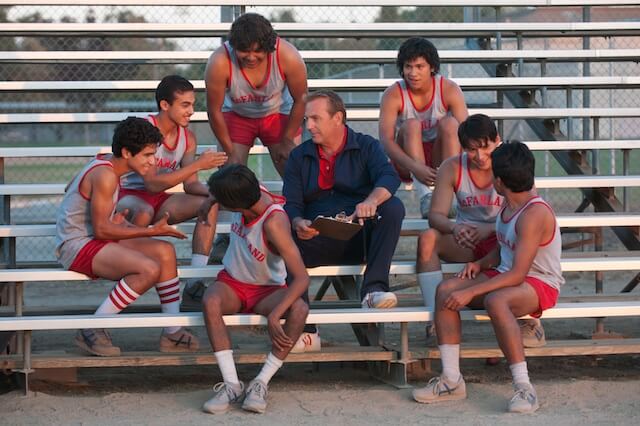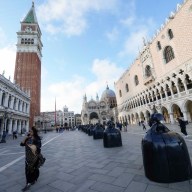‘McFarland USA’ In last year’s “3 Days to Kill,” Kevin Costner made a spectacularly failed attempt to get in on Liam Neeson’s “Peppy Fogey Fighting Romp” biz. This year he’s emerged with a type no one’s doing: semi-racists who become white saviors to minorities. In “Black or White” he played an alkie not above deploying the n-word who helped everyone navigate through our country’s modern racial landscape, and also saved a junkie. In the far less questionable — which is to say still very, very questionable — “McFarland USA,” he’s a white man banished to a poor Mexican neighborhood in California. He can’t wait to leave, and he thinks he’s found his ticket out: coaching a septet of Hispanic high schoolers into cross-country gods. Of course he’ll learn to love his young charges and find a stronger sense of community there than he’d get in a McMansion suburb. But here’s the good part of “McFarland”: the question of what Costner’s Jim White will do with his inevitable success hangs around longer, is handled more sincerely and becomes more profound than it does in, say, “Doc Hollywood,” in which a city type comes to embrace small town life. “McFarland” doesn’t do that. It ties assimilation to class and race, unfolding in a country where success means wealth and goods and pulling one’s self out of the bootstraps (i.e., escaping whatever hell from which you sprang). Most of the film’s seven kids work the fields when they’re not in school, but “McFarland” stresses that even if racing leads to better occupations, that shouldn’t mean chucking their history, family and identity to the ground. Rather than a mere sports weepie, this is a passionate cry for building communities rather than looking out for number one. So that’s the good thing, and the less good thing is that “McFarland”’s actual interest in the Mexican portion of its cast, while greater than most Hollywood fare, still hovers around the superficial line. Of the seven runners, only three get any personality, and even they score no greater than types: the nice kid (Carlos Pratts), the reformed ladies man (Sergio Avelar), the pudgy kid who learns to sprint (Ramiro Rodriguez). “McFarland” goes relatively light on the “white people scared of others” scenes, though it winds up trading in the kind of nobility that is itself condescending and casually, unconsciously racist-ish. The film stops dead in fright as a row of cars pull up, only to reveal — surprise! — the apparent gangbangers are actually nice! It stokes white fear only to present its minorities as both harmless and lacking in personality. The actors themselves try their best, but the filmmakers always quickly retreat to its white cast members. Director Niki Caro (“Whale Rider”) goes relatively light on gawking at minorities, as it does with everything. She doesn’t indulge in cinematic manipulation — the kind, as in the films of Ron Howard, that means sadistically extracting audience tears with rusty pliers. But she goes too light, if anything. She has no idea how to film the racing scenes, which are pedestrian and indifferently filmed. She’s so uninterested in the running that a handful of races are conflated not into a cheesy montage but Costner reading about them aloud from a newspaper article. “McFarland” acts as though downplaying the genre’s pomp will make it more respectable, but it winds up with the same problem as Costner’s performance, which straddles the line between enjoyably grouchy and simply bored. Any filmmaker sufficiently engaged would have noticed that Maria Bello, as his alternately nagging/supportive wife, was seizing upon every last inch of a nothing role and given her something, anything to do.
Director: Niki Caro
Stars: Kevin Costner, Maria Bello
Rating: PG
2 (out of 5) Globes
Review: Kevin Costner is a white savior, again, in ‘McFarland USA’

Ron Phillips
Follow Matt Prigge on Twitter @mattprigge


















